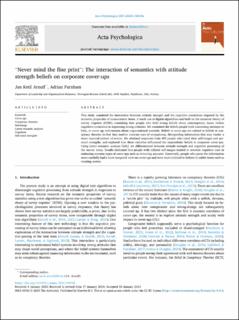“Never mind the fine print”: The interaction of semantics with attitude strength beliefs on corporate cover-ups
Journal article, Peer reviewed, Others
Published version
Permanent lenke
https://hdl.handle.net/11250/3127260Utgivelsesdato
2024Metadata
Vis full innførselSamlinger
Originalversjon
10.1016/j.actpsy.2024.104156Sammendrag
This study examined the interaction between attitude strength and the cognitive constraints imposed by the semantic properties of measurement items. It made use of digital algorithms and built on the semantic theory of survey response (STSR), examining how people who hold strong beliefs about contemporary issues violate cognitive constraints in expressing strong attitudes. We examined the beliefs people hold concerning attempts to hide, or cover up, information about organisational scandals. Beliefs in cover-ups are related to beliefs in conspiracy theories in that they tend to overrate cues of wrongdoing, disregarding information that may render a more nuanced picture of events. We obtained responses from 405 people who rated their self-images and personal strengths, and explored how these variables influenced the respondents' beliefs in corporate cover-ups. Using latent semantic analysis (LSA), we differentiated between attitude strength and cognitive processing of the survey items. Results indicated that people with inflated self-images tended to override cognitive cues in endorsing extreme types of cover-ups such as removing accusers. Conversely, people who parse the information more carefully had a more tempered view on cover-ups and were more inclined to believe in subtle forms such as twisting stories.

